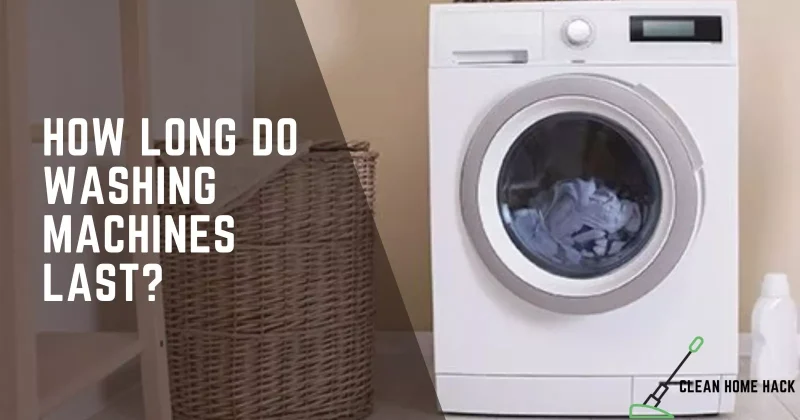How Long Do Washing Machines Last? [7 Signs to Replace or Repair]

 The Short Answer is: The Short Answer is: |
| The average lifespan of a washing machine is between 10 to 13 years, depending on the type, quality, and frequency of use. Factors that affect the lifespan of a washing machine include the frequency of use, maintenance, and the type of machine. Proper usage and regular maintenance can help extend the life of a washing machine. |
You’ve heard the saying: ‘Time and tide wait for no man.’ The same is true for washing machines! Many factors contribute to the lifespan of a washing machine, and it’s important to understand them to determine how long yours will last.
On average, a washing machine should last between 10-13 years with proper care and maintenance. Different types of washing machines will also vary in durability, so it’s important to look for signs of aging and consider replacing or repairing them when necessary.
With the right care, you can prolong the lifespan of your washing machine and help reduce its environmental impact when it’s time to dispose of it. In this article, we will explore the topic, “How Long Do Washing Machines Last?”
Table of Contents
Factors Affecting Washing Machine Longevity
There are several factors that affect how long your washing machine will last. Usage, maintenance, age, and quality of the machine all play a role in determining the longevity of a washing machine.
Usage is a major factor that determines a washing machine’s lifespan. If you use your washing machine frequently, it will wear out much quicker than a washing machine used less often.
If you use the wrong settings, such as hot water on a fabric that should only be washed in cold water, you can cause damage to the machine. Maintenance is also important in ensuring a washing machine’s longevity.
You should clean the inside of your washing machine regularly, and run a cycle of hot water and vinegar to clean the hoses. Additionally, you should check the hoses regularly for cracks or other signs of damage.
The age of the washing machine is also an important factor to consider. Newer machines are more energy-efficient and have better features and technology than older models.
Finally, the quality of the washing machine will influence its lifespan. Low-end machines won’t last as long as higher-end models due to their lower-quality parts and lack of features.
Average Lifespan of Washing Machines
Continuing the discussion on factors affecting a washing machine’s longevity, it’s important to consider the average lifespan of a washing machine.
Most experts agree that the average life of a washing machine is around 10 years, depending on the model, how often it’s used, and the quality of maintenance.
Generally speaking, front-loading washing machines tend to last longer than top-loading models due to their more efficient parts and design.
When calculating the average lifespan of a washing machine, it’s important to factor in how much you use it. If you wash a large amount of clothes on a daily basis, the machine may need to be replaced sooner than the average 10 years. O
n the other hand, if you only use it occasionally, it can last longer. It is also essential to remember that proper maintenance is key for the longevity of any washing machine.
Make sure to clean out the lint filter after every load, and don’t overload the machine. Additionally, it’s advisable to use the right detergent and make sure not to use too much.
Types of Washing Machines and Durability
While maintaining and using your washing machine correctly can help extend its life, the type of machine you choose will also play a role in how long it will last.
Generally, top-loading washing machines with agitators, are the least expensive and tend to last the longest. On the other hand, front-loading washing machines with impellers, are usually more expensive and have a shorter lifespan than top-loading machines.
Also, high-end washing machines tend to last longer than low-end machines, but they also come with a higher price tag. The washing machine’s lifespan can also depend on the amount of use it gets.
If the machine is used daily and heavily, it will likely wear down quicker than a machine that’s used sparingly. Overall, the type of washing machine and how often it’s used will have the biggest impact on its lifespan.
Investing in a quality machine that’s designed to last, can help to ensure that your washing machine will last for many years to come. However, no matter the type or quality of the machine, it’s important to regularly maintain and use it properly to extend its washing machine lifespan.
Signs Indicating Washing Machine Aging
If you’ve had your washing machine for a few years, you may start noticing signs that it’s aging. It’s normal to wonder how long should washing machines last.
While there’s no definitive answer, the average life expectancy of a washing machine is around 10-13 years, though some can last up to 20 years.
Signs of aging include increased noise levels, reduced spin cycles, leaking water, poor cleaning results, longer wash times, and issues with the timer. Other signs of aging are a musty smell, rusting, and visible wear and tear.
If any of these signs are present, it may be time to consider replacing your washing machine. Regular maintenance is key to ensuring your machine lasts as long as possible, so consider getting your washing machine serviced regularly.
If it’s time to purchase a new washing machine, consider more energy-efficient models that will help you save money in the long run.
Maintenance and Care for Prolonging Lifespan
Your washing machine’s lifespan can be extended with proper maintenance and care. Regularly cleaning the exterior and interior of the machine can help to prolong its life.
Empty the lint filter after each load and periodically clean the inside of the machine with a damp cloth and mild detergent. Make sure hoses and connections are secure and free of cracks.
Check the hoses regularly for signs of wear and regularly check the drum seals and rubber door seals for damage. Additionally, be sure to use the right amount of detergent and the correct settings for each load.
It’s also important to regularly inspect your washing machine for signs of wear and tear. Pay special attention to any strange noises, vibrations, or leaks. If any of these issues arise, contact a professional for help.
When to Consider Replacing or Repairing a Washing Machine
Here are some signs to consider when deciding whether to replace or repair your washing machine:
- Machine not starting: If you press the button and nothing happens, it’s a sign that your washing machine requires professional repair.
- Unusual sounds: If your washing machine starts making sounds that it didn’t before, it’s a cause for alarm. New machines may have a squeaking sound, but in older machines that didn’t have a squeaking machine before, it might be time for a washing machine repair.
- Excessive noise: If your washing machine is thumping, bumping, or grinding, it is a sign that the machine is either off-balance or that something much bigger is wrong.
- Water not draining: If water hasn’t drained from the drum, it’s a sign that your washing machine needs repair.
- Water in the drum after a cycle: If you open the door after the wash, rinse, and spin cycles to find sopping wet items, it’s a sign that your washing machine needs repair.
- Machine is 10 years or older: The average lifespan of a washing machine is 10 to 13 years. When you begin to see any problems with your washer after its 10th birthday, you’ll likely be better off replacing the washer rather than repairing it.
- Safety issues: If there are safety issues with your washing machine, it’s better to replace it than to repair it.
If you notice any of these signs, it’s best to call a professional repair technician to diagnose and repair the issue. However, if your washing machine is 10 years or older and requires major repairs, it may be more economical to replace it with a new one.
Environmental Impact and Disposal
Washing machines contain hazardous materials that can pollute the air and water if they’re not disposed of properly. Even machines that are no longer functioning can still contain hazardous materials, so it’s important to properly discard them.
If you’re considering a new washing machine, make sure you’re aware of how to safely dispose of the old one. Before disposing of a washing machine, make sure to check with your local municipality or recycling center to get the proper disposal instructions.
If the washing machine is still in good condition, it may be possible to donate it to a local charity or organization. If the washing machine isn’t in working condition, you should contact a local waste management company to arrange for proper disposal.
It’s also important to consider the environmental impact of a washing machine. Look for an Energy Star-certified model, which can reduce energy and water consumption by up to 50%.
Additionally, if you’re replacing an older model, make sure to properly recycle the old parts. When it comes to washing machines, it’s important to consider the environmental impact and proper disposal.
Proper disposal can help extend the life of the washing machine and reduce its negative environmental impacts. Make sure to research all of your options before making a purchase.
Frequently Asked Questions Related to the Topic:
How Long Do Samsung Washers Last?
A Samsung washing machine can last between 10 to 13 years if it is cared for properly. It is generally recommended to replace large appliances, such as washing machines, every eight years.
The lifespan of a Samsung washer and dryer will depend on various factors, including the model, frequency of use, and maintenance. A good quality machine that is well-maintained can last longer than a cheaper one.
How Long Do Lg Washing Machines Last?
The lifespan of an LG washing machine can vary depending on factors such as usage, maintenance, and model. On average, an LG washing machine can last for 10-15 years with proper care and maintenance.
Regular maintenance, such as cleaning the machine and checking for any issues, can help prolong its lifespan. Additionally, using the machine according to the manufacturer’s instructions and avoiding overloading can also contribute to its longevity.
What Is the Difference Between Front-Load and Top-Load Washing Machines?
Wow! Front-load and top-load washing machines are like night and day. Front-load machines use less water and energy but can cost a fortune. Top-loaders are cheaper but use more resources. Unbelievably, the difference is huge!
What Is the Most Energy-Efficient Washing Machine?
You should look for a washing machine that is Energy Star certified. These machines use less energy and water, saving you money in the long run.
What Is the Best Way to Maintain a Washing Machine?
Shockingly, you can make your washing machine last longer with simple maintenance. Clean the filter regularly, run a hot cycle every month, and use the right detergent for maximum efficiency.
Conclusion on How Long Do Washing Machines Last
You’ve learned the factors affecting washing machine longevity, the average lifespan of different types, signs of aging, how to maintain and care for them, and when to consider replacing or repairing them.
With proper maintenance and care, your washing machine can last for years to come, saving you time, money, and even the environment.
By being mindful of the lifespan of your washing machine, you’ll be able to get the most out of your machine and keep it functioning for far into the future.







